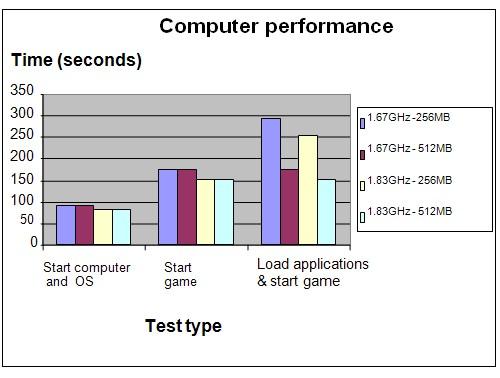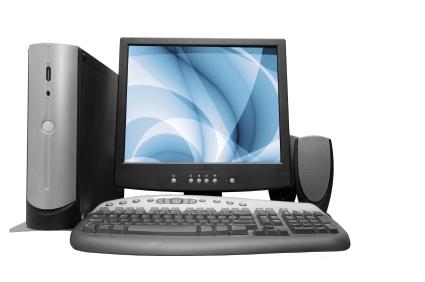| Complexity level: | 9 |
| Project cost ($): | 150 |
| Time required: | 2 days to prepare, 1 hour for the experiment |
| Material availability: | Easily found at a computer store |
| Safety concerns: | Ensure computer's power supply is switched off BEFORE opening the case cover or removing any parts, and ensure that the computer has been safely reassembled before turning the power supply back on. Adult supervision is required. |
Hypothesis
Increasing the CPU speed will make a computer work faster.
Overview
Computer upgrading
Upgrading a computer can involve changing its motherboard, CPU, RAM, hard disk drive, DVD reader/writer, video card, sound cards, network cards and many other things. However, it is the CPU and the RAM that will affect the speed and performance of a computer.
A computer's RAM (random access memory) can be changed quite easily and quickly. RAMs are also very cheap compared to other computer upgrades. The more RAM a computer has, the less the number of times the computer will have retrieving data from the hard disk drive (a much slower process). Additional RAM is required if the computer starts to run slowly when too many files and programs are opened concurrently.
Upgrading the CPU in the computer is a more complicated matter. A faster CPU will make the computer perform tasks and run applications more quickly. However, finding another CPU that is compatible with your computer's motherboard is not so straightforward a process. The chosen CPU must match the socket type on the motherboard. Moreover, merely increasing the speed of the processor without providing additional RAM, may not result in significant improvement in the performance and the speed of the computer.
Scientific Terms
Materials
The materials required for this science fair project:
- 1 desktop computer with a Core2 Duo T5500–1.67GHz processor and 512MB RAM
- a Core 2 Duo T5500-1.83GHz CPU
- 256MB RAM
- 1 computer game software (use software that heavily utilizes your PCs resources,for example the Tomb Raider game)
- a stopwatch
Procedure
1. For this experiment, the independent variable is the CPU clock speed and the size of RAM used in the computer. The dependent variable is the time taken to start up the computer and start the game. This is determined by measuring the amount of time taken with a stopwatch. The constants (control variables) are hard disk size, front side bus (FBS) speed and other specifications of the computer.
2. The computer is originally installed with the Core2 Duo T5500–1.67GHz processor and 512MB RAM.
3. The following checks were done on the computer :
a. the time taken to start the computer was recorded.
b. the time taken to load the game was recorded.
c. Startup five other application programs before the game program is again loaded. The time taken to load was again noted and recorded.
4. The RAM was changed to 256 MB and procedure 3 was repeated.
5. The CPU was changed to the Core 2 Duo T5500-1.83GHz while the RAM remains at 256 MB, procedure 3 was again repeated.
6. With the 1.83GHz CPU, change the RAM to 512 MB and repeat procedure 3 once again.

Results
The results show that using a CPU with a higher clock speed will enable the computer to operate faster, whilst adding the RAM does not make much difference unless there are other application programs running in the background. Applications running in the background will consume additional RAM. Therefore, 256MB RAM was insufficient in order for theall of the application programs to be run concurrently, whilst starting the game program without slowing down the system. Consequently, the time taken to startup the game, increased.
|
Hardware configuration |
Time taken to perform task (seconds) |
||
|
Start computer and OS |
Startup game |
Load applications and startup game |
|
|
Duo T5500–1.67GHz and 256MB RAM |
93 |
176 |
294 |
|
Duo T5500–1.67GHz and 512MB RAM |
93 |
176 |
176 |
|
Duo T5500–1.83GHz and 256MB RAM |
82 |
152 |
256 |
|
Duo T5500–1.83GHz and 512MB RAM |
82 |
152 |
152 |
The chart below represents the results of our experiment:

Conclusion
The hypothesis that increasing the CPU speed will make a computer work faster is proven to be true.
Computers normally become obsolete after 2 or 3 years. Newer software may run very slowly or may not run at all. When this happens, the decision to buy a new computer or upgrade the existing computer will have to be made. If you are to upgrade your computer, it is best to ensure that you first upgrade the components that would result in a significant improvement in performance.
Also consider
The experiment can be repeated by using different brands of CPU.
Try to repeat the experiment using different types of RAM (with different frequency ratings).
References
Upgrading your computer components - http://www.techsoup.org/learningcenter/hardware/page4789.cfm
Upgrade or replace - http://compreviews.about.com/od/general/a/UpgradeReplace.htm

